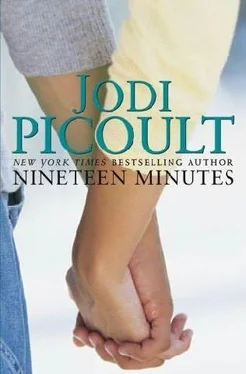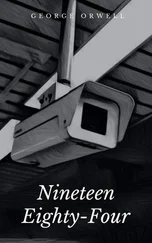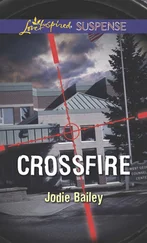“Yes.”
“He didn’t look like he was running right toward you, did he?”
“I guess not.”
“He looked like he was just trying to run up the stairs, right?”
“Yeah.”
“And you were just waiting on the stairs, correct?”
“Yes.”
“So it’s fair to say that you were in the wrong place at the wrong time?”
“Objection,” Ms. Leven said.
The judge-a big man with a mane of white hair who sort of scared Zoe-shook his head. “Overruled.”
“No further questions,” the lawyer said, and then Ms. Leven rose again. “After Peter went inside,” she asked, “what did you do?”
“I started screaming for help.” Zoe looked into the gallery, trying to find her mother. If she looked at her mother, then she could say what she had to say next, because it was already over and that was what you had to keep remembering, no matter how much it felt like it wasn’t. “At first nobody came,” Zoe murmured. “And then…then everybody did.”
Michael Beach had seen Zoe Patterson leaving the room where the witnesses were sequestered. It was a weird collection of kids-everyone from losers like himself to popular kids like Brady Pryce. Even stranger, no one seemed to be inclined to break into their usual pods-the geeks in one corner, the jocks in another, and so on. Instead, they’d all just sat down next to each other at the one long conference table. Emma Alexis-who was one of the cool, beautiful girls-was now paralyzed from the waist down, and she rolled her wheelchair up right beside Justin. She’d asked him if she could have half of his glazed donut.
“When Peter first came into the gym,” the prosecutor asked, “what did he do?”
“Wave a gun around,” Michael said.
“Could you see what kind of gun it was?”
“Well, like a smallish one.”
“A handgun?”
“Yes.”
“Did he say anything?”
Michael glanced at the defense table. “He said ‘All you jocks, front and center.’”
“What happened?”
“A kid started to run toward him, like he was going to take him down.”
“Who was that?”
“Noah James. He’s-he was-a senior. Peter shot him, and he just collapsed.”
“Then what happened?” the prosecutor asked.
Michael took a deep breath. “Peter said, ‘Who’s next?’ and my friend Justin grabbed me and started dragging me to the door.”
“How long had you and Justin been friends?”
“Since third grade,” Michael said.
“And then?”
“Peter must have seen something moving, so he turned around and he just started to shoot.”
“Did he hit you?”
Michael shook his head and pressed his lips together.
“Michael,” the prosecutor said gently, “who did he hit?”
“Justin got in front of me when the shooting started. And then he…he fell down. There was blood everywhere and I was trying to stop it, like they do on TV, by pushing on his stomach. I wasn’t paying any attention to anything anymore, except Justin, and then all of a sudden I felt a gun press up against my head.”
“What happened?”
“I closed my eyes,” Michael said. “I thought he was going to kill me.”
“And then?”
“I heard this noise, and when I opened my eyes, he was pulling out the thing that had all the bullets in it and jamming in another one.”
The prosecutor walked up to a table and held up a gun clip. Just seeing it in her hand made Michael shudder. “Is this what went into the gun?” she asked.
“Yes.”
“What happened after that?”
“He didn’t shoot me,” Michael said. “Three people ran across the gym, and he followed them into the locker room.”
“And Justin?”
“I watched it,” Michael whispered. “I watched his face while he died.”
It was the first thing he saw in the morning when he awakened, and the last thing he saw before he went to bed: that moment where the shine in Justin’s eyes just dulled. When the life left a person, it wasn’t by degrees. It was instant, like someone pulling down a shade on a window.
The prosecutor came closer. “Michael,” she said, “you all right?”
He nodded.
“Were you and Justin jocks?”
“Not even close,” he admitted.
“Were you part of the popular crowd?”
“No.”
“Had you and Justin ever been bullied by anyone in school?”
Michael glanced, for the first time, at Peter Houghton. “Who hasn’t?” he said.
As Lacy waited for her turn to speak on Peter’s behalf, she thought back to the first time she realized she could hate her own child.
Lewis had a bigwig economist from London coming to dinner, and in preparation, Lacy had taken the day off work to clean. Although she had no doubts about her prowess as a midwife, the nature of her work meant that toilets didn’t get cleaned on a regular basis; that dust bunnies bloomed beneath the furniture. Usually, she didn’t care-she thought a house that was lived in was preferential to one that was sterile-unless company was coming over; then pride kicked in. So that morning, she’d gotten up, made breakfast, and had already dusted the living room by the time Peter-a sophomore, then-threw himself angrily into a chair at the kitchen table. “I have no clean underwear,” he fumed, although the rule in the house was that when his laundry bin filled, he had to do his own wash-there was so little that Lacy ever asked him to do, she didn’t think this one task was unreasonable. Lacy had suggested that he borrow some from his father, but Peter was disgusted by that, and she decided to let him figure it out on his own. She had enough on her plate.
She usually let Peter’s room stand in utter pigsty disarray, but as she passed by that morning, she noticed his laundry bin. Well, she was already home working, and he was at school. She could do this one thing for him. By the time Peter got home that day, Lacy had not only vacuumed and scrubbed the floors, cooked a four-course meal, and cleaned the kitchen-she had also washed, dried, and folded three loads of Peter’s laundry. They were piled on the bed, clean clothing that covered the entire six-foot span of the mattress, segregated into pants, shirts, undershorts. All he had to do was set them into his closet, his drawers.
Peter arrived, sullen and moody, and immediately hurried upstairs to his room and his computer-the place he spent most of his time. Lacy-arm deep in the toilet, at that point, scouring-waited for him to notice what she’d done for him. But instead, she heard him groan. “God! I’m supposed to put all this away?” Then he slammed his bedroom door so loud that the house shook around her.
Suddenly, Lacy couldn’t see straight. She had-of her own volition-done something nice for her son-her ridiculously spoiled son-and this was how he acted in return? She rinsed off the scrubbing gloves and left them in the sink. Then she stomped upstairs to Peter’s room and threw open the door. “What is your problem?”
Peter glared at her. “What’s your problem? Look at this mess.”
Something inside Lacy had snapped like a filament, igniting her. “Mess?” she repeated. “I cleaned up the mess. You want to see a mess?” She reached past Peter, knocking over a pile of neatly folded T-shirts. She grabbed his boxer shorts and threw them on the floor. She shoved his pants off the bed, hurled them at his computer, so that his tower of CD-ROMs fell over and the silver disks scattered. “I hate you!” Peter yelled, and without missing a beat, Lacy yelled back, “I hate you, too!” Only then did she realize that she and Peter were now the same height; that she was arguing with a child who stood eye-level with her.
She backed out of Peter’s room, and he slammed the door behind her. Almost immediately, Lacy burst into tears. She hadn’t meant it-of course she hadn’t. She loved Peter. She just, at that moment, hated what he’d said; what he’d done. When she knocked, he wouldn’t answer. “Peter,” she said. “Peter, I’m sorry I said that.”
Читать дальше












